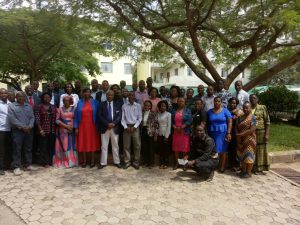Partnership to strengthen Research ethics and Medicines regulation in Tanzania
The University of St Andrews in partnership with Tanzania’s National Institute for Medical Research (NIMR), Tanzania Food and Drug Authority (TFDA) and Kilimanjaro Clinical Research Institute (KCRI) launched SMERT project on 23rd April 2018 in Dar es Salaam, the capital of Tanzania. SMERT: Streamlining health research ethics and medicines regulation in Tanzania is a two-year project funded by EDCTP – http://www.edctp.org. Launched by the Chief Medical Officer of Tanzania’s Ministry of health in presence of delegates from NIMR, TFDA and Institutional Research ethics boards (IRBS), SMERT will develop systems capacity to ensure compliance to ethics of health research, clinical trials and regulations for safety and quality of medicines.
Dr. Wilber Sabiiti represented the University of St Andrews at the launch. Doctors, Morven Shearer, Janet Gillespie and Wilber Sabiiti make up the St Andrews SMERT team. Dr Nyanda Elias Ntinginya of NIMR-Mbeya Medical Research Centre is leading SMERT in supported by Dr Ruby Mcharo of NIMR Mbeya Medical Research Centre, Dr. Ndekya Oriyo of the National Health Research Ethics Committee at NIMR HQ, Ms. Kissa Mwamwitwa of TFDA, Prof. Blandina Mmbaga of KCRI as well as Mrs Joyce Ikingura former deputy secretary of the National Health Research Ethics Committee at NIMR HQ. SMERT will conduct a baseline assessment through an audit of Tanzania’s IRBs, national Research ethics committees, clinical trials technical committee and TFDA’s pharmacovigilance system to identify needs for capacity development. SMERT’s approach is to deliver need-focused capacity development that will increase efficiency and promote compliance to ethical principles in research and clinical practice. It will offer opportunities for further training and education to members of Ethics Committees and regulatory authorities, and also to future doctors. University of St Andrews will support development of training resources and split site training of master and PhD students under the project. By building connections and improving communications, SMERT hopes to encourage the smooth transfer of important and appropriate information between key institutional players.
Furthermore, from these interventions, SMERT seeks to raise awareness and promote dialogue among policy makers and healthcare implementers about the importance of ensuring appropriate ethical standards for health research within Tanzania. Medicines are becoming more complex in their actions and interactions just when medical research is becoming more global in its organisation. SMERT highlights the importance of robust procedures that are open to public scrutiny so that the investigator has confidence in their administration and the investigated is confident that their welfare is both valued and safe-guarded.
It is SMERT’s mission to raise the ethical standards and pharmacovigilance capacity of Tanzania to host local and international clinical trials. Currently, over 90% of clinical trials in Africa are conducted in South Africa because of their strong pharmacovigilance and health system capacity. Tanzania wants to change this trend by putting systems in place that will make them the best destination for pre- and post- registration medicines clinical trials.
